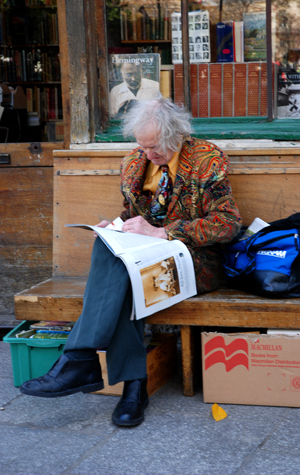An Appreciation: The Last Chapter of a Bibliophile’s Life
Famed Parisian bookseller and BU alum George Whitman dies

He sold books for a living, but George Whitman was a character to match any created by the most imaginative fiction writer: “undernourished, bearded, a saint among his books, lending them, housing penniless friends upstairs” (Anaïs Nin), “an odd blend of disheveled eccentricity and prodigal generosity…a small, withered man with tiny, birdlike eyes” (The Telegraph of London), “a bohemian and a socialist who trusted humanity” (author Charles Glass), and “a bum all my life” (self-description).
Whitman (COM’35, SMG’35), who died at 98 shortly before Christmas, founded Shakespeare and Company, a harbor for any writer from expatriate celebrities to drug-addled wannabes, in 1951. Bracketed by the Seine and Notre-Dame, the store, named after the French bookshop that was the Jazz Age haunt of Hemingway and Fitzgerald, attracted its own literary glitterati for readings and book signings, among them Nin, Henry Miller, James Baldwin, Samuel Beckett, William Burroughs, and Allen Ginsberg.
Frugal as a caveman, Whitman abjured telephones, security cameras, and credit cards unless they were used as doorlock picks, The Telegraph reported, adding that the native New Jerseyan patiently endured the “regular occurrence” of having his cash box vanish. But he saw his business as more than a business, calling it “a socialist utopia masquerading as a bookshop.”
“The location was a major source of energy and comfort for American writers,” says James Siemon, a College of Arts & Sciences professor of English. One patron of Whitman’s who became his pal was the Beat poet and San Francisco bookseller Lawrence Ferlinghetti. Writing on his own shop’s website following Whitman’s death, Ferlinghetti bid adieu to “my oldest friend in the world, gone over the hill!” adding that “he’ll live forever in thousands of people whose lives he directly affected—all those who passed through the open-hearted life of his bookstore…”
“I like to think of myself as a lamplighter,” akin to the medieval monks whose lights at dusk guided weary travelers, Whitman told Bostonia a decade ago. After majoring in journalism at BU, he said, he embarked on a literal walk around the world that ended in Panama when he was blocked by jungle terrain. But along the way, he told the magazine, he met both poor people and the proverbial kindness of strangers, leading him to offer a similar refuge in his Paris bookshop. Indeed, he hung a sign there with a quote from William Butler Yeats: “Be not inhospitable to strangers lest they be angels in disguise.”

A former World War II Army medic, Whitman opened his shop after studying French civilization at the Sorbonne, seeding his shelves with books he’d bought with his G.I. Bill benefits. “The bookshop was open-door to anybody coming through Paris [who] needed a place to sleep,” author Glass told National Public Radio. “George used to leave the door unlocked. He trusted everyone. The arrangement was that if they can work an hour a day for him, they can have a place to sleep,” either in beds parked around the bookshelves or in more comfortable digs upstairs. Whitman estimated that 50,000 folks bedded down in the shop over the years.
His daughter, Sylvia Beach Whitman, who will continue to run the store, told the New York Times that her father had many romances and was married to her mother only briefly. It makes sense for a man whose true love was the shop from which he was inseparable. Fittingly, after almost a century of life, he died in the apartment he kept over the store.

Comments & Discussion
Boston University moderates comments to facilitate an informed, substantive, civil conversation. Abusive, profane, self-promotional, misleading, incoherent or off-topic comments will be rejected. Moderators are staffed during regular business hours (EST) and can only accept comments written in English. Statistics or facts must include a citation or a link to the citation.